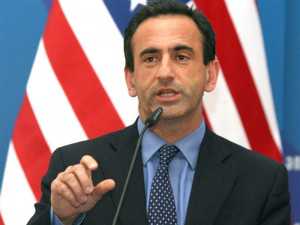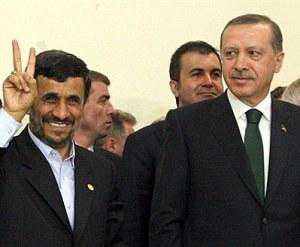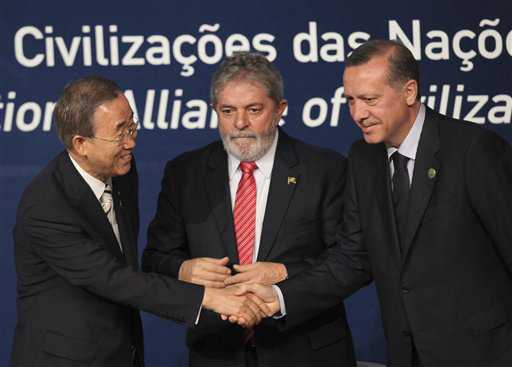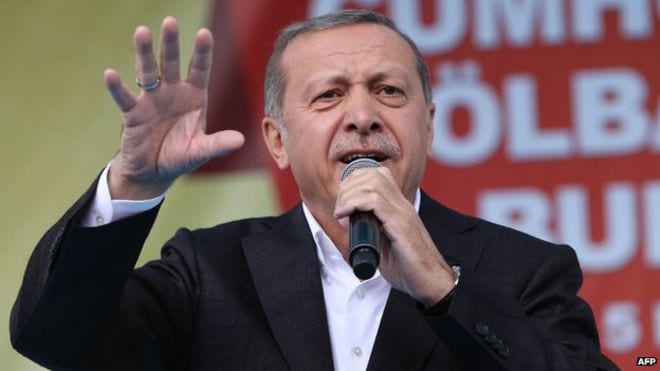Turkey Prioritizes Independent Regional Policies in the Middle East and the South Caucasus
Publication: Eurasia Daily Monitor Volume: 7 Issue: 105
June 1, 2010
By: Saban Kardas
Turkey continued its regional diplomacy, following the historic visit by Russian President Medvedev to Ankara (EDM, May 20). Prime Minister Tayyip Erdogan paid back-to-back trips to Greece, Iran and Azerbaijan, which underscored Turkey’s rising activism in its neighborhood, as well as highlighting divergence with the United States.
The most controversial development was the deal Turkey brokered jointly with Brazil regarding the Iranian nuclear issue. Building on the groundwork laid by their foreign ministers, Turkish and Brazilian leaders convinced their Iranian counterpart to agree on a proposal made earlier by the international community, under which it would swap its low-enriched uranium with enriched rods for a medical research reactor. The exchange will take place in Turkey.
Turkey portrayed the agreement as a historic achievement that would end the stalemate over Iran’s nuclear program, and bring peace to the Middle East, emphasizing that Iran agreed to sign a document stipulating concrete obligations (www.cnnturk.com, May 17). However, the reactions to the deal from the United States and Western powers put Turkey in a rather controversial position rather than to earn the sort of praise it was anticipating. Since the deal came amidst news that the United States succeeded in getting other permanent members of the UN Security Council agree on new sanctions, this development increasingly pit Ankara and Washington against each other.
From an American perspective, the deal was not satisfactory because Iran agreed to the conditions proposed back in October 2009 while it did not commit to end its nuclear program. In particular it is emphasized that while the amount of fuel Iran agrees to return, 1,200 kilograms, was significant at the time it was first proposed, since then Iran is likely to have expanded its stockpile of enriched uranium, which is not under inspection. Turkish Foreign Minister, Ahmet Davutoglu, remained defiant. Arguing that the United States was kept informed about the negotiations with Iran, Davutoglu contended that Iran’s promises were satisfactory and should be the basis of efforts to solve the diplomatic standoff (Today’s Zaman, May 20). Meanwhile, a recent development somehow adds credibility to Turkey’s arguments. Reportedly, Obama sent a letter to Brazilian President in April wherein he urged him to pursue the efforts to convince Iran to accept the exchange the 1,200 kilograms of uranium on Turkish territory, though noting that the US would also pursue the sanctions path (letter available at:www.politicaexterna.com/archives/11023.
Amid statements coming from the United States and other powers that concerns over Iran’s nuclear program did not disappear, Erdogan sought to mobilize the international community behind the deal with Iran. He telephoned President Barack Obama, Russian Prime Minister Vladimir Putin and many other leaders, as well as sending letters to many others, asking them to prevent sanctions against Iran and give diplomacy a chance. Although Obama appreciated Turkish efforts, he underlined that they would expect to see Iran’s interpretation of the deal, and kept the option for sanctions open (Anadolu Ajansi, May 20, May 22).
Iran sent a letter to the International Atomic Energy Agency (IAEA) on Monday explaining the deal brokered by Turkey and Brazil in detail. As anticipated, while the United States did not find Iran’s commitments satisfactory, Turkey insisted on its earlier position. Meanwhile, Erdogan started his historic tour of South America. Speaking in Brazil, he reiterated in strong words that the deal brokered by Brazil and Turkey was a historical breakthrough, and they would continue to work toward a nuclear free world (www.haberturk.com, May 28).
The challenges posed by Iran’s nuclear program are unlikely to subdue, as Iran remains committed to continue with its program. Turkey’s policy so far demonstrates that it is increasingly self-confident in undertaking foreign policy initiatives in its region and toward that end it could even risk confrontation with the United States. Especially the fact that Turkey went ahead with these efforts despite the news about a new draft UN Security Council being prepared is worth mentioning here. Turkey has made clear on many occasions that it would not approve tougher measures against Iran considering the negative repercussions of such a move (EDM, March 20). Reiterating this position on several regional and international platforms, Davutoglu invested much of his time on this issue over the last couple of months, as he and his team held numerous meetings with their Iranian counterparts to find a negotiated solution. Therefore, Turkish leaders would not like to see all their efforts go in vain as a result of a new round of sanctions, which would pose a serious blow to their credibility in the region and at home.
Overall, the Turkish leaders seem to assume good will on Iran’s part and do not seriously consider the possibility that Iran might be manipulating their willingness to mediate in this crisis to undermine the quasi-coalition the United States has delicately managed to form. Given Iran’s track record, the United States is increasingly concerned that Iran might not be acting in good faith and is using such last-minute deals to avoid tougher reactions (Today’s Zaman, May 24). Given these conflict interpretations of Iran’s nuclear program, we might observe growing divergence of opinions between Ankara and Washington.
Erdogan also paid a visit to Baku and Tbilisi, following his trip to Tehran, which also underscored another dimension of Ankara’s regional policies, conducted independently of Washington’s priorities. After the normalization with Armenia, which was promoted by Washington, hit an apparent deadlock, Erdogan’s trip to Baku served as yet another affirmation of Ankara’s determination to keep Baku at the center of its Caucasus policy. Erdogan reiterated support for the Azeri position on Karabakh, which seemed to go a long way toward repairing the damage caused by Turkey’s efforts to achieve a rapprochement with Armenia.
As a concrete indication of such a thaw, it is expected that Azerbaijani leader Ilham Aliyev will visit Turkey in early June. Aliyev had avoided visiting Turkey in apparent protest of Turkish-Armenian normalization and Turkey’s position on the natural gas negotiations (EDM, October 21, 2009). A deal recently reached between the two countries would bring an end to the negotiations concerning the price for Turkey’s purchases from Azerbaijan and conditions for the passage of Azeri gas to Europe through Turkish territory. Although the agreement was expected to be signed during Erdogan’s visit, it is postponed for Aliyev’s visit by which time the two parties will also finalize the remaining details. While saying that they “will crown the agreement during Mr. President’s visit,” Erdogan perhaps expressed how much he attaches significance to Aliyev’s upcoming trip (Hurriyet, May 17).







